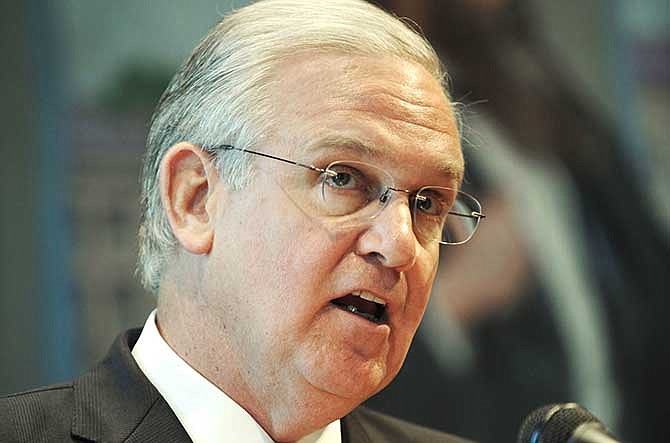Missouri Gov. Jay Nixon on Thursday vetoed the bills allowing alcohol sales at the state Capitol and letting local governments transfer some closed pension plans to LAGERS, the state's Local Government Employees Retirement System.
State Sen. Mike Kehoe sponsored the pensions bill and handled Rep. Tom Flanigan's alcohol sales bill in the Senate.
The alcohol sales measure "grants the Capitol Commission and the Office of Administration the authority to enter into contracts for vending products here in the state Capitol," Kehoe, R-Jefferson City, reminded fellow senators on May 6, shortly before they passed the House bill by a 25-4 vote.
He said the sales would be allowed "only in conjunction with our commemorating the 100th anniversary of the Capitol."
In April, the Senate had debated Kehoe's version of the same bill, passing it by a 30-3 margin after rejecting an amendment to allow the sale of goods but not alcohol during the special events the commission wants to hold.
During the April debate, Kehoe - who is a member of the Capitol Commission, which is charged with the building's preservation, restoration and renovation, as well as the recording of its history - had explained: "The Capitol Commission intends to hold several events over the next several years that would commemorate various 100th anniversary milestones ... including when we actually celebrated the Capitol grand opening, which was in 1924."
The alcohol sales measure passed the House on March 4 with a 151-1 margin.
In his two-page veto message, Nixon wrote: "The Capitol is and should remain a place that thousands of children and their families feel comfortable visiting every year. (They) come to the Capitol to learn more about this historic symbol of our state, (not) to see the sale of liquor by the drink."
He also objected that the bill "does not restrict sales in the presence of minors, nor does it limit sales to certain hours of operation."
The pension bill, which Nixon also vetoed, was not testified against in either the House or the Senate
committee hearings on it, and the Jefferson City Firefighters Pension Board's vice chairman, Norm Robinson, testified for the bill in both committee hearings.
"We are a prime example of a system that would benefit from this," Robinson told the Senate's Seniors, Families and Pensions Committee in February. "The active firefighters are already in LAGERS, as are all the other city employees in Jeff City."
The House passed it by a 136-10 margin on April 29, after it cleared the Senate on March 27, on 33-0 vote.
The bill would have allowed the transfer only for older pension plans operated by cities and counties that already have current employees on the LAGERS plan.
But Nixon's veto letter said the bill "would place the authority to exercise this option solely in the hands of the political subdivision employer," such as the Jefferson City Council, "even if the transfer was opposed by the plan trustees who, unlike the political subdivision employer, have a fiduciary obligation to plan participants."
The governor also objected to a provision in the bill that allowed the transfer even if a city's charter requires "a vote of the plan membership in order for there to be a change in the retirement plan for police officers and firefighters."
Jefferson City officials were looking at the veto and how it affects their plans.
Kehoe was not available to comment on this story.

